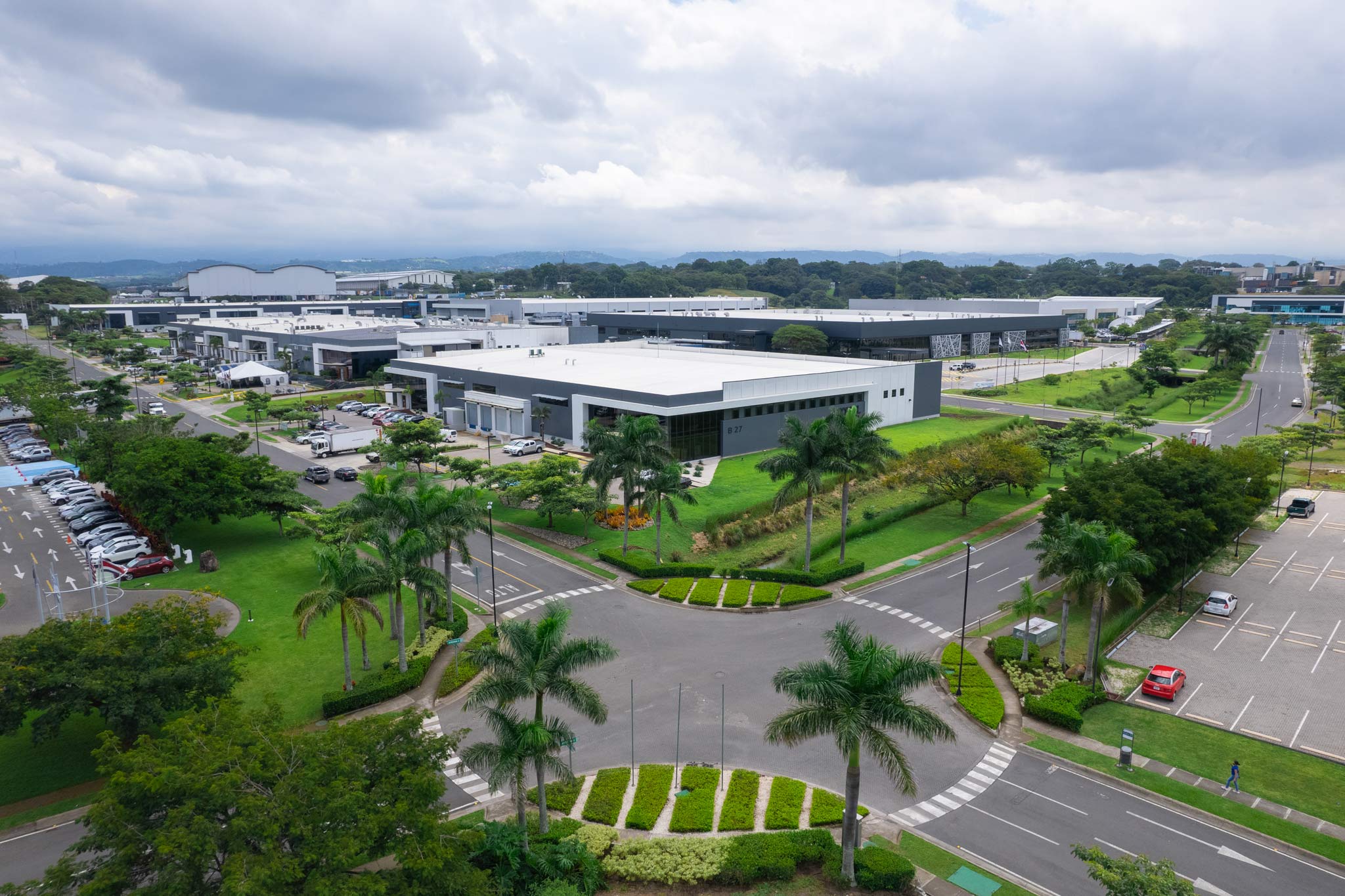31 world-class companies opt for the Park’s competitive advantages
- LEED-certified buildings, electronic payment for mobility services, eco-efficient gardens, reduction of carbon emissions, and the use of clean energy confirm environmental commitments
September. With an investment of more than US$400 million, Coyol Free Zone (CFZ) offers companies that have decided to locate in this park a world-class real estate development and sustainable industrial operation.
Its vision allows it to innovate with state-of-the-art architectural and construction design, to implement worldwide trends in sustainability and quality assurance required by the 31 global companies that the Park houses today.
After 15 years of competing internationally as a leader in the Life Sciences sector, this Free Zone currently has just over 280,000 square meters of industrial building construction, and 2021 was the year with the most square meters built in the history of Coyol Free Zone (11.32% of the Park’s maximum construction capacity).
As part of its competitive advantages, 19% of the total built area corresponds to LEED-certified buildings. The companies located there have eco-efficient gardens, designed and built to minimize the impact on the environment, and the Free Trade Zone has the Esencial Costa Rica certification, granted by the Foreign Trade Promoter of Costa Rica (PROCOMER). It is also the first Free Trade Zone in the country to obtain ISO 9001:2015 certification for Construction Project Management.
“As leaders in the development of industrial parks in Costa Rica, our commitment is to offer our clients the best real estate solutions and world-class infrastructure, inside a park with excellent construction practices, ensuring the reduction of carbon emissions and promoting the use of clean energy”, observed Carlos Wong, Managing Director of Coyol Free Zone.
With this vision, CFZ works with sustainable construction parameters, such as the LEED (Leadership in Energy and Environmental Design) certification scheme, which is recognized internationally, having been created by the U.S. Green Building Council.
LEED evaluates parameters such as efficiency in energy consumption, water, alternative energy, quality of the internal environment, choice of materials, and waste management in the construction process. Currently, 7 buildings in the Coyol Free Zone have LEED certifications: Platinum (1), Gold (2) and Silver (4).
For the development of sustainable infrastructure, the Park has a team of highly specialized engineers and experts in the construction of industrial buildings, thanks to their experience in project management for the Life Sciences industry, a sector with rigorous global standards of biosafety and quality.
Since the creation of this park, its leaders have had the vision to protect and develop a business activity in harmony with the environment. “Our statement of environmental commitments reflects this vision of protection and sustainable management of natural resources,” said Wong.
Innovation and Environmental Sustainability
As part of its actions for sustainable real estate development, the Coyol Free Zone operation has a focus on innovation and continuous improvement to identify and develop new projects that allow for a better development of the free zone.
One of the recent projects with the greatest impact is Ride Coyol, a sustainable mobility platform designed to reduce the social, environmental, economic and health impacts of those who work in the Free Trade Zone. This is an electronic payment system in an exclusive mobility service for employees of the Park’s companies, using 200 bus units, which saves 8.3 tons of paper per year by eliminating the need to print 20,000 tickets per day.
In terms of management systems, almost all of the companies operating from the Coyol Free Zone seek more efficient construction materials to achieve savings in building operation, Solar-E glass that allows light to pass through but does not heat the interior, insulated roof coverings that reduce heat load, and the possibility of collecting and reusing rainwater in the cooling and sanitation systems.
In addition, all the companies operating in the Free Trade Zone have spaces that promote the wellbeing and integral care of the employees, with the necessary conditions for their productivity and comfort in the work spaces.
One of the aspects that most attract the attention of those who enter or stay in the park is the amount of vegetation and trees that coexist harmoniously with the buildings and manufacturing plants, to the point that visitors describe it as a “green free zone”.
Thus, the policy of conserving green areas is designed to protect water resources, conserve native tree species, and also offer a recreational component for workers and visitors.
“Our efforts to maintain green areas have paid off in terms of conservation and protection of vital natural resources for the planet, and to attract new companies that wish to operate in a place where environmental sustainability is demonstrated through concrete actions”, commented Wong.

